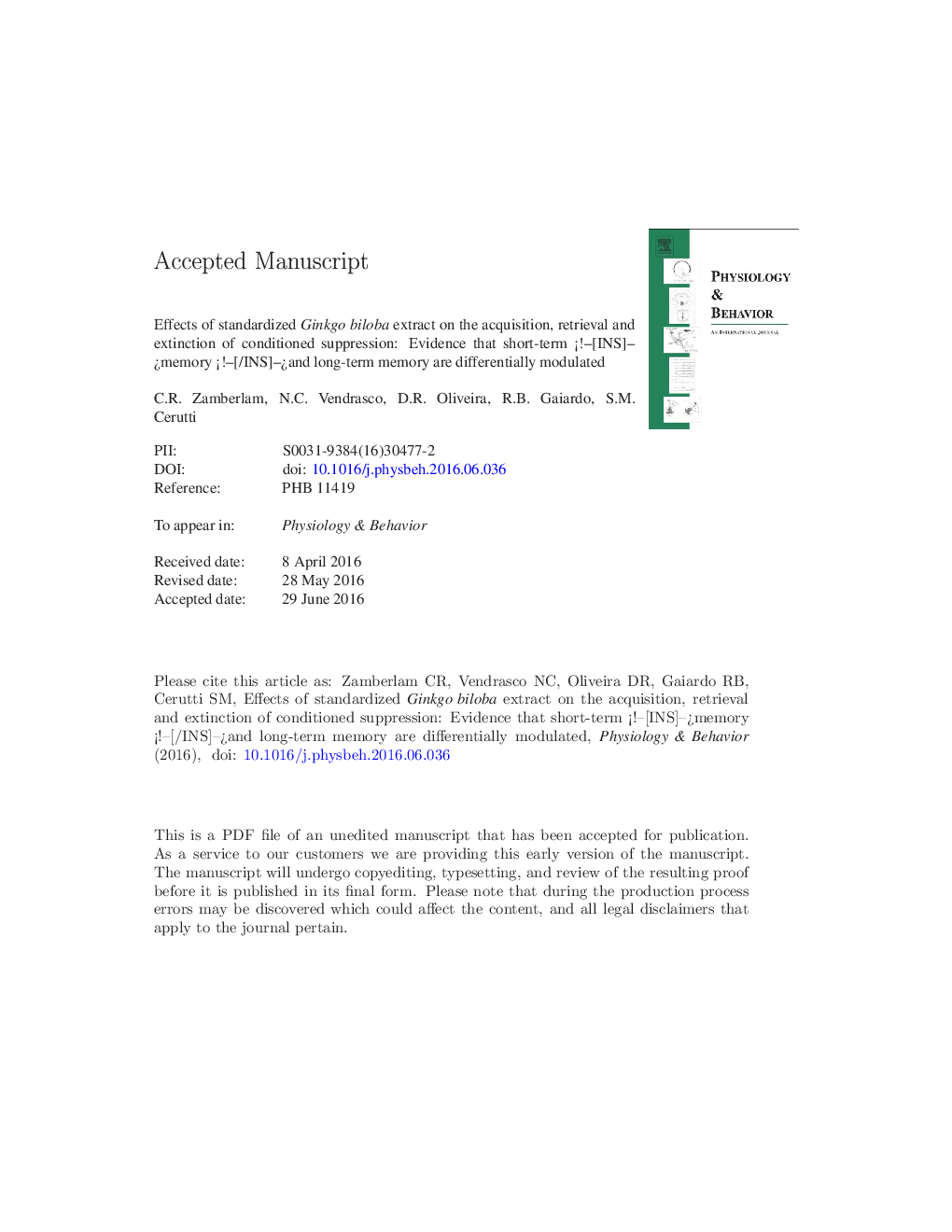| کد مقاله | کد نشریه | سال انتشار | مقاله انگلیسی | نسخه تمام متن |
|---|---|---|---|---|
| 5922759 | 1571154 | 2016 | 52 صفحه PDF | دانلود رایگان |
عنوان انگلیسی مقاله ISI
Effects of standardized Ginkgo biloba extract on the acquisition, retrieval and extinction of conditioned suppression: Evidence that short-term memory and long-term memory are differentially modulated
ترجمه فارسی عنوان
اثرات عصاره گینکوبای بیولوک استاندارد شده بر اکتساب، بازیابی و انقراض سرکوب شرطی: شواهدی که حافظه کوتاه مدت و حافظه طولانی مدت به صورت متفاوتی مدولاسیون می شوند
دانلود مقاله + سفارش ترجمه
دانلود مقاله ISI انگلیسی
رایگان برای ایرانیان
موضوعات مرتبط
علوم زیستی و بیوفناوری
بیوشیمی، ژنتیک و زیست شناسی مولکولی
فیزیولوژی
چکیده انگلیسی
Studies in our laboratory have characterized the putative neuromodulatory effects of a standardized extract of the green leaves of Ginkgo biloba (EGb), which comprises a formulation of 24% ginkgo-flavoglycosides and 6% ginkgo-terpenoid lactones, on conditioned suppression. This model comprises a suitable animal model for investigating the behavioral changes and pharmacological mechanisms that underlie fear memory and anxiety. The characterization of the effects on distinct stages of fear memory or fear extinction will help illustrate both the beneficial and harmful effects. Three hundred adult male Wistar rats were randomly assigned to 30 groups according to the treatment as follows: i-ii) control groups (CS-US and CSno-US); iii) vehicle group (12% Tween®80); and iv-vi) EGb groups (250, 500 and 1000 mg kgâ 1); or experimental procedures designed to assess the effects of EGb treatment prior to the acquisition (n = 20 per group) and retrieval of conditioned fear (n = 10 per group) or prior to the extinction training (n = 10 per group) and extinction retention test (n = 10 per group). Furthermore, to better understand the effects of acute EGb treatment on fear memory, we conducted two additional analyses: the acquisition of within- and between-session extinction of fear memory (short- and long-term memory, respectively). No difference was identified between the control and treatment groups during the retention test (P > 0.05), with the exception of the CSno-US group in relation to all groups (P < 0.05). A between-session analysis indicated that EGb at 250 mg kgâ 1 facilitated the acquisition of extinction fear memory, which was verified by the suppression ration in the first trial of extinction training (SR = 0.39) and the extinction retention test session (SR = 0.53, P < 0.05), without impairments in fear memory acquisition, which were evaluated during the retention test (SR = 0.79). Moreover, EGb administered at 1000 mg kgâ 1 prior to conditioning did not enhance the long-term extinction memory, i.e., it did not prevent the return of extinguished fear memory in the extinction retention test, in which the spontaneous recovery of fear was demonstrated (SR = 0.63, P < 0.05); however, it significantly facilitated short-term memory as verified by data from the within-session extinction (1 to 8-10 trials) during the retention test (SR = 0.73 to SR = 0.59; P < 0.05) and the extinction retention test (SR = 0.63 to SR = 0.41; P < 0.05). Moreover, spontaneous recovery was identified in response to a higher dose of EGb when administered prior to extinction training (SR = 0.75, P < 0.05) and the extinction retention test (SR = 0.70; P < 0.05). At dose of 500 mg kgâ 1 EGb reduced the suppression ratio when administered prior to the retention test (SR = 0.57) and extinction training (SR = 0.55; P < 0.05) without preventing the acquisition of fear memory, which suggests that EGb has anti-anxiety effects. Taken together, the current findings suggest that EGb differentially modulates short- and long-term memory, as well as anxiety-like behavior. The actions of EGb may provide information regarding the beneficial effects in the prevention and treatment of neurocognitive impairments and anxiety disorders. Additional analyses are necessary to facilitate an understanding of these effects; however, previous data from our group suggest that GABAergic, serotoninergic and glutamatergic receptors are potential targets of the effects of EGb on conditioned suppression.
ناشر
Database: Elsevier - ScienceDirect (ساینس دایرکت)
Journal: Physiology & Behavior - Volume 165, 15 October 2016, Pages 55-68
Journal: Physiology & Behavior - Volume 165, 15 October 2016, Pages 55-68
نویسندگان
C.R. Zamberlam, N.C. Vendrasco, D.R. Oliveira, R.B. Gaiardo, S.M. Cerutti,
